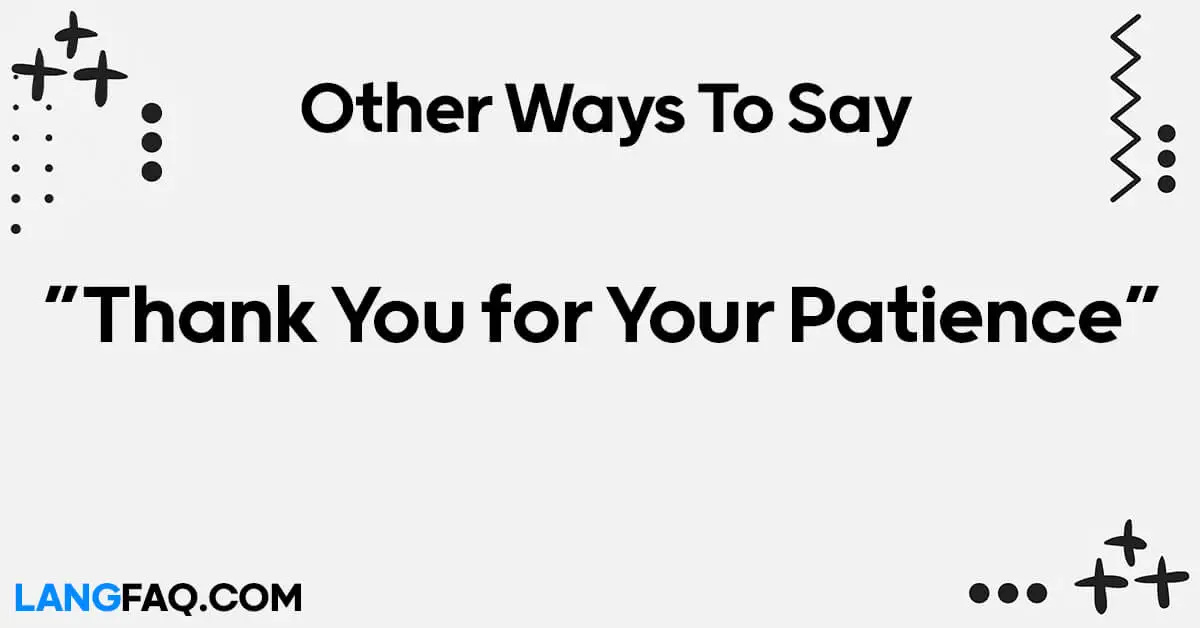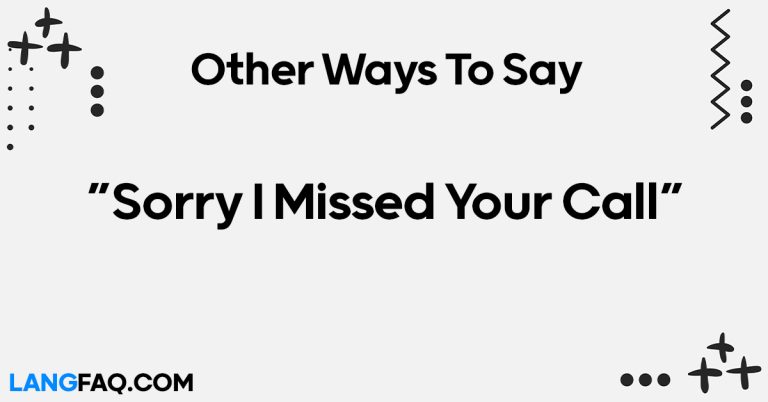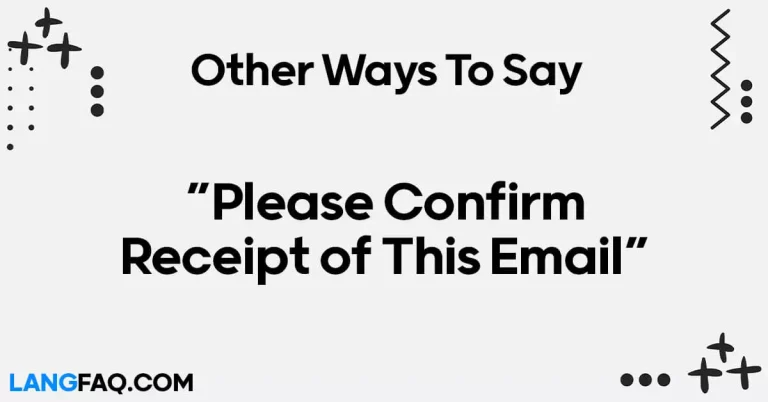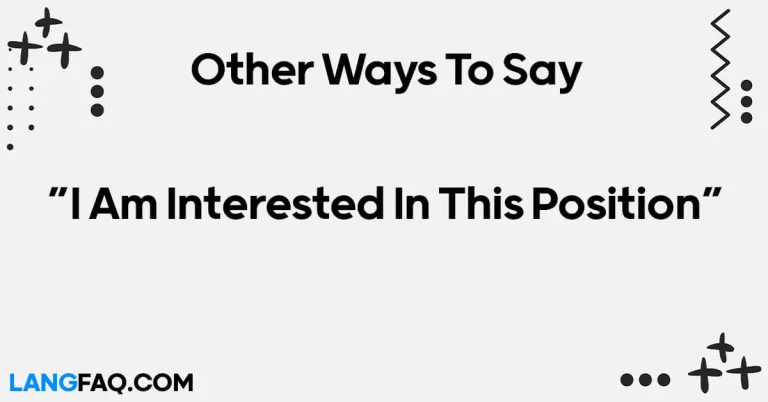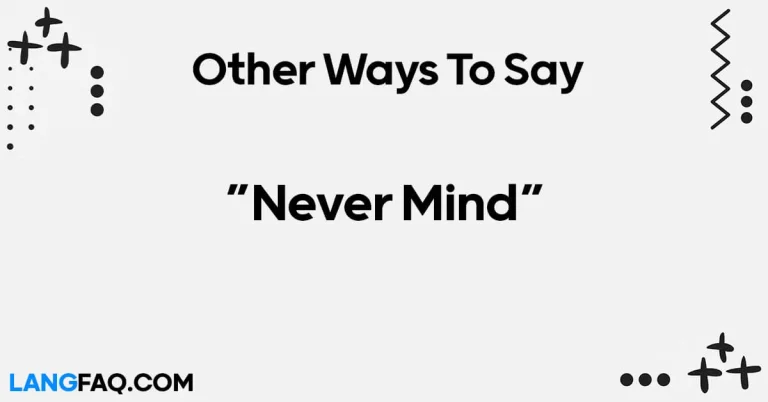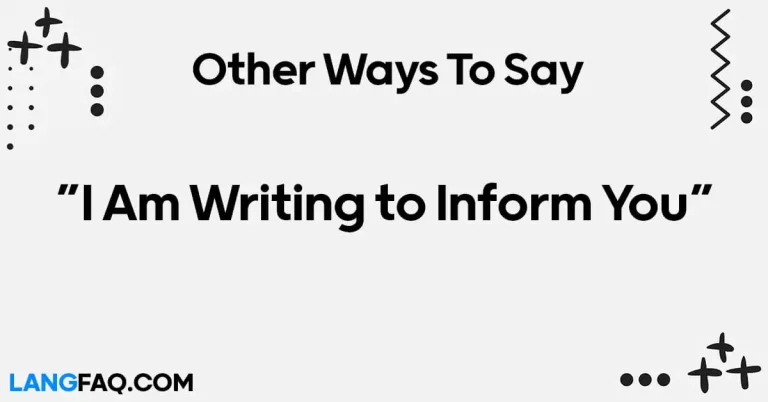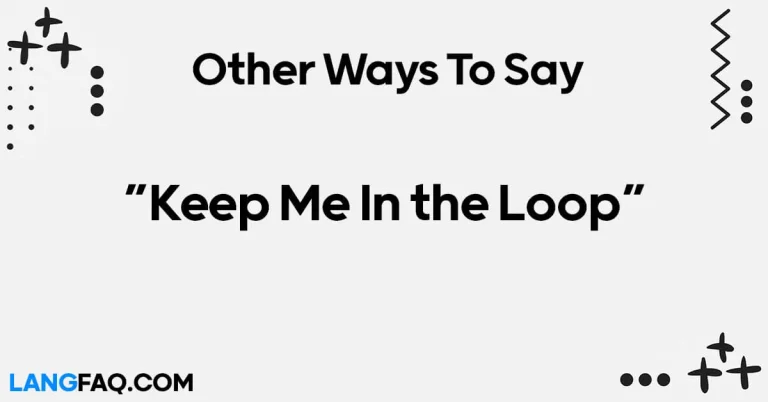Expressing gratitude is an art, and saying “Thank You for Your Patience” can be conveyed in numerous ways. In this comprehensive guide, we’ll delve into 12 creative alternatives that not only express appreciation but also add a personal touch to your words. Master the art of acknowledging others with finesse.
12 Other Ways to Say “Thank You for Your Patience”
Here are 12 creative alternatives to express “Thank You for Your Patience”:
- Gratitude for Your Understanding
- Appreciation for Your Tolerance
- Acknowledgment of Your Perseverance
- Recognition of Your Endurance
- Thanks for Bearing With Me
- Kudos for Your Calmness
- Commendation for Your Composure
- Hats Off to Your Steadfastness
- Cheers for Your Waiting
- Big Thanks for Your Accommodating Nature
- A Big Shout-Out for Your Understanding
- High Five for Your Unwavering Patience
| Expression | Meaning | Example |
|---|---|---|
| Gratitude for Your Understanding | Appreciation for someone’s comprehension | “I want to express my gratitude for your understanding during this challenging project.” |
| Appreciation for Your Tolerance | Acknowledgment of someone’s patience | “Thank you for your tolerance in dealing with the unexpected delays.” |
| Recognition of Your Perseverance | Acknowledging someone’s determination | “Your perseverance in overcoming obstacles has been truly commendable.” |
| Thanks for Bearing With Me | Acknowledging someone’s willingness to endure | “I appreciate you bearing with me during this learning process.” |
| Kudos for Your Calmness | Applauding someone’s composed demeanor | “Kudos for your calmness, which brings a sense of peace to our team.” |
| Commendation for Your Composure | Praising someone’s ability to stay composed | “Your commendable composure in high-pressure situations is truly admirable.” |
| Hats Off to Your Steadfastness | Expressing admiration for someone’s unwavering commitment | “Hats off to your steadfastness in pursuing excellence in every task.” |
| Cheers for Your Waiting | Expressing thanks for someone’s patience in waiting | “Cheers for your waiting; I appreciate your time and patience during our meeting.” |
| Big Thanks for Your Accommodating Nature | Expressing gratitude for someone’s flexible attitude | “A big thanks for your accommodating nature, which makes collaboration smoother.” |
| A Big Shout-Out for Your Understanding | Public acknowledgment of someone’s understanding | “A big shout-out for your understanding; your support has been invaluable to the team.” |
| High Five for Your Unwavering Patience | Celebrating someone’s consistent patience | “High five for your unwavering patience; it truly makes a difference in our work environment.” |
Expressing gratitude comes in various forms, and these alternatives to “Thank You for Your Patience” offer a spectrum of ways to convey appreciation. Whether acknowledging understanding, praising composure, or celebrating steadfastness, these expressions allow for a personalized and heartfelt approach to thanking others for their patience.
Is It Correct to Say “Thank You for Your Patience”?
Yes, saying “Thank You for Your Patience” is a correct and polite way to express gratitude when someone has waited for you, endured delays, or demonstrated patience in a particular situation. This phrase is commonly used in various contexts, both in professional and personal settings.
Here are a few scenarios where saying “Thank You for Your Patience” is appropriate:
- Professional Correspondence:
- After a delay in responding to an email or completing a task: “Thank you for your patience; I appreciate your understanding as I worked through the task.”
- Customer Service Interactions:
- When resolving an issue or dealing with a customer query: “Thank you for your patience as we worked to address your concerns. Your understanding is valuable to us.”
- Meeting or Presentation Delays:
- Before or after a meeting that started later than planned: “Thank you for your patience. We appreciate your understanding, and we’ll make every effort to ensure promptness in the future.”
- Personal Relationships:
- When a friend or family member has been waiting for you: “I’m sorry for the delay, and thank you for your patience. Your understanding means a lot to me.”
- In a Group Setting:
- When addressing a group after a delay or unexpected situation: “Thank you all for your patience. Your cooperation during these unforeseen circumstances is greatly appreciated.”
Using this expression not only conveys gratitude but also recognizes and appreciates the understanding and tolerance of others. It acknowledges the value of their time and the virtue of patience, contributing to positive and respectful communication.
Professional Mail Example With “Thank You for Your Patience”
Subject: Project Update and Appreciation for Your Patience
Dear [Recipient’s Name],
I trust this email finds you well. I wanted to provide you with an update on the progress of [Project Name] and express my sincere gratitude for your patience throughout this process.
As we strive for excellence in the project deliverables, there have been unforeseen challenges and necessary adjustments to ensure the highest quality outcomes. Your understanding and patience during this period have been invaluable to the success of the project.
I want to assure you that the team is diligently working to address any delays and enhance the overall efficiency of our workflow. Your commitment to this project is commendable, and your patience is genuinely appreciated.
In the coming days, we anticipate [specific developments or milestones], and we are eager to share the positive outcomes with you. Your continued support and patience fortify our collaborative efforts.
Once again, thank you for your understanding, and please feel free to reach out if you have any questions or require further clarification. Your patience is a testament to the strength of our partnership, and we are dedicated to delivering a project that exceeds expectations.
Looking forward to achieving milestones together.
Best regards,
[Your Full Name] [Your Position] [Your Company] [Contact Information]
Gratitude for Your Understanding
Expressing gratitude for someone’s understanding is a powerful way to convey appreciation in various situations. Whether it’s a colleague comprehending a complex project or a friend understanding your personal challenges, acknowledging their understanding fosters a positive connection.
When to Use: In professional settings, this expression is ideal when colleagues navigate intricate tasks together, showcasing the importance of mutual understanding. In personal relationships, it’s perfect for moments when friends provide emotional support, demonstrating a deep understanding of your feelings.
Example Sentence: “I want to express my gratitude for your understanding during this challenging project. Your ability to grasp complex concepts has truly elevated our team’s performance.”
Variations:
- Colleague Context: “I appreciate your professional understanding of the intricacies involved in this project.”
- Friend Context: “Thanks for understanding my need for some time alone. Your support means a lot.”
Email Sample:
Subject: Appreciation for Your Understanding
Dear [Recipient’s Name],
I hope this email finds you well. I wanted to take a moment to express my sincere gratitude for your understanding during our recent project. Your ability to comprehend the complexities involved and your support have been instrumental in our success. It truly makes working together a pleasure.
Thank you once again for your understanding.
Best regards, [Your Name]
Appreciation for Your Tolerance
Acknowledging someone’s tolerance is essential, especially in situations where patience is tested. This expression goes beyond a simple thank-you, emphasizing the value of the person’s patience in the face of challenges.
When to Use: In a professional setting, this phrase is apt when colleagues endure unforeseen delays or navigate demanding clients. On a personal level, it fits situations where friends show patience during difficult conversations or unexpected changes in plans.
Example Sentence: “Thank you for your tolerance in dealing with the unexpected delays. Your patience has contributed significantly to the smooth flow of our project.”
Variations:
- Colleague Context: “I appreciate your professional tolerance in handling the challenges that arose during the client meeting.”
- Friend Context: “Thanks for your tolerance when I needed to reschedule our plans. Your flexibility means a lot.”
Email Sample:
Subject: Gratitude for Your Tolerance
Dear [Recipient’s Name],
I wanted to extend my heartfelt thanks for your tolerance during our recent project. Your ability to handle unexpected challenges with patience has made a considerable difference. I value your dedication and understanding.
Thank you once again for your tolerance.
Best regards, [Your Name]
Recognition of Your Perseverance
Recognizing someone’s perseverance is a powerful way to express gratitude for their determination and commitment. Whether it’s a professional project or a personal goal, acknowledging their steadfastness adds depth to your appreciation.
When to Use: In a professional context, recognizing perseverance is suitable when colleagues overcome obstacles or meet tight deadlines. On a personal level, it fits situations where friends display resilience in pursuing their goals despite challenges.
Example Sentence: “Your perseverance in overcoming obstacles has been truly commendable. It’s inspiring to see your unwavering commitment to excellence.”
Variations:
- Colleague Context: “I want to recognize your professional perseverance in meeting the challenging deadlines. Your dedication is truly admirable.”
- Friend Context: “Cheers to your perseverance in pursuing your passion. Your commitment is truly inspiring.”
Email Sample:
Subject: Recognition of Your Perseverance
Dear [Recipient’s Name],
I hope this message finds you well. I wanted to take a moment to recognize your perseverance during our recent project. Your commitment to overcoming challenges has not gone unnoticed, and it has greatly contributed to our success.
Thank you for your perseverance.
Best regards, [Your Name]
Thanks for Bearing With Me
Acknowledging someone’s willingness to endure and bear with you is a gracious way to express gratitude, especially when your actions or circumstances might have tested their patience.
When to Use: In professional scenarios, this phrase is fitting when colleagues navigate through a learning curve or when unexpected challenges arise. On a personal level, it’s perfect for situations where friends or family members show understanding during times of personal growth or change.
Example Sentence: “I appreciate you bearing with me during this learning process. Your support has made the journey smoother, and I’m grateful for your patience.”
Variations:
- Colleague Context: “Thanks for bearing with me as I adjusted to the new software. Your assistance has been invaluable.”
- Friend Context: “I’m grateful for you bearing with me during this challenging period. Your friendship means a lot.”
Email Sample:
Subject: Gratitude for Bearing With Me
Dear [Recipient’s Name],
I wanted to express my gratitude for bearing with me during our recent project. Your patience and support have made a significant impact on the overall outcome. Thank you for your understanding and collaboration.
Best regards, [Your Name]
Kudos for Your Calmness
Applauding someone’s composed demeanor is an excellent way to express appreciation for their ability to stay calm, especially in high-pressure situations.
When to Use: In a professional setting, this phrase suits situations where colleagues maintain composure during critical presentations or challenging discussions. On a personal level, it’s fitting when friends or family members display calmness in moments of stress.
Example Sentence: “Kudos for your calmness, which brings a sense of peace to our team. Your ability to stay composed in challenging situations is truly admirable.”
Variations:
- Colleague Context: “I want to extend kudos for your professional calmness during the client meeting. It positively impacted our presentation.”
- Friend Context: “Cheers to your calmness during that stressful situation. Your composed attitude made all the difference.”
Email Sample:
Subject: Applause for Your Calmness
Dear [Recipient’s Name],
I hope this email finds you well. I wanted to extend my applause for your calmness during our recent project. Your composed demeanor greatly contributed to the success of our team. Thank you for your steadfastness.
Best regards, [Your Name]
Commendation for Your Composure
Praising someone’s ability to stay composed is a valuable form of appreciation, particularly in situations demanding grace under pressure.
When to Use: In professional contexts, this phrase is fitting for acknowledging colleagues who handle stressful situations with composure, contributing to a positive work environment. On a personal level, it works well when friends or family members display composure during emotional or challenging discussions.
Example Sentence: “Your commendable composure in high-pressure situations is truly admirable. It not only reflects your professionalism but also positively influences those around you.”
Variations:
- Colleague Context: “Commendations for your professional composure during the crisis. Your ability to stay calm elevated the team’s response.”
- Friend Context: “I wanted to express my appreciation for your composure during our conversation. Your calm approach made it easier to discuss sensitive topics.”
Email Sample:
Subject: Commendation for Your Composure
Dear [Recipient’s Name],
I wanted to send a quick note to commend you for your composure during our recent project. Your ability to stay calm under pressure has not gone unnoticed, and it has had a positive impact on our team. Thank you for your professionalism.
Best regards, [Your Name]
Hats Off to Your Steadfastness
Expressing admiration for someone’s steadfastness is a powerful way to convey gratitude for their unwavering commitment and resilience.
When to Use: In a professional setting, this phrase is suitable for recognizing colleagues who consistently deliver high-quality work despite challenges. On a personal level, it’s fitting when friends or family members display steadfastness in supporting you through thick and thin.
Example Sentence: “Hats off to your steadfastness in pursuing excellence in every task. Your dedication is truly commendable and serves as an inspiration to those around you.”
Variations:
- Colleague Context: “I want to acknowledge your professional steadfastness during this project. Your commitment has significantly contributed to our success.”
- Friend Context: “Hats off to your steadfast friendship. Your unwavering support means the world to me.”
Email Sample:
Subject: Admiration for Your Steadfastness
Dear [Recipient’s Name],
I hope this message finds you well. I wanted to take a moment to express my admiration for your steadfastness in our recent endeavors. Your commitment to excellence is truly inspiring. Thank you for your unwavering dedication.
Best regards, [Your Name]
Cheers for Your Waiting
Expressing thanks for someone’s patience in waiting is a courteous way to acknowledge their time and understanding, particularly in situations where delays or unforeseen circumstances occur.
When to Use: In professional scenarios, this phrase is fitting when colleagues patiently await important updates or during extended meetings. On a personal level, it suits situations where friends or family members show patience when plans are delayed.
Example Sentence: “Cheers for your waiting; I appreciate your time and patience during our meeting. Your understanding in the face of delays is truly commendable.”
Variations:
- Colleague Context: “A big thank you for your professional waiting during the extended discussions. Your patience in awaiting critical information is invaluable.”
- Friend Context: “Cheers for waiting for me during our dinner plans. Your understanding and patience are truly appreciated.”
Email Sample:
Subject: Appreciation for Your Waiting
Dear [Recipient’s Name],
I wanted to extend my heartfelt thanks for your waiting during our recent meeting. Your patience did not go unnoticed, and I truly appreciate your understanding in the face of unexpected delays.
Thank you once again for your waiting.
Best regards, [Your Name]
Big Thanks for Your Accommodating Nature
Expressing gratitude for someone’s accommodating nature is a warm way to appreciate their flexibility and adaptability in various situations.
When to Use: In professional settings, this phrase is suitable when colleagues adjust to changing circumstances or accommodate differing opinions. On a personal level, it works well when friends or family members show flexibility in plans or decisions.
Example Sentence: “A big thanks for your accommodating nature, which makes collaboration smoother. Your flexibility and adaptability contribute positively to our team dynamics.”
Variations:
- Colleague Context: “I appreciate your professional accommodating nature in considering alternative approaches. Your flexibility is an asset to our team.”
- Friend Context: “A big shout-out for your accommodating nature during our trip. Your flexibility made the experience enjoyable for everyone.”
Email Sample:
Subject: Big Thanks for Your Accommodating Nature
Dear [Recipient’s Name],
I wanted to take a moment to extend a big thanks for your accommodating nature. Your flexibility and adaptability significantly contribute to the success of our collaborative efforts. Thank you for being so accommodating.
Best regards, [Your Name]
A Big Shout-Out for Your Understanding
Publicly acknowledging someone’s understanding is a positive way to express gratitude and highlight their supportive role, especially in group or team settings.
When to Use: In professional contexts, this phrase is fitting when colleagues display a collective understanding of challenges, fostering a positive team culture. On a personal level, it’s effective when friends or family members show understanding in group dynamics or events.
Example Sentence: “A big shout-out for your understanding; your support has been invaluable to the team. Your ability to foster a positive atmosphere is commendable.”
Variations:
- Colleague Context: “I want to give a big shout-out for your professional understanding during our team project. Your support has elevated our collaboration.”
- Friend Context: “A big thanks for your understanding during our group outing. Your positive attitude made the day memorable for everyone.”
Email Sample:
Subject: Public Appreciation for Your Understanding
Dear [Recipient’s Name],
I hope this message finds you well. I wanted to send a public shout-out for your understanding during our recent project. Your support and positive approach have not gone unnoticed, and it has significantly contributed to our team’s success.
Thank you for your understanding.
Best regards, [Your Name]
High Five for Your Unwavering Patience
Celebrating someone’s consistent patience is a lively way to express appreciation, especially when their enduring support is a key factor in a project or personal journey.
When to Use: In professional settings, this phrase is fitting when colleagues consistently demonstrate patience in overcoming obstacles. On a personal level, it works well when friends or family members show unwavering support over an extended period.
Example Sentence: “High five for your unwavering patience; it truly makes a difference in our work environment. Your consistent support is a cornerstone of our success.”
Variations:
- Colleague Context: “I want to celebrate your professional high five for unwavering patience throughout this project. Your consistency is truly commendable.”
- Friend Context: “High five for your continuous support. Your unwavering patience has been my anchor during challenging times.”
Email Sample:
Subject: Celebration of Your Unwavering Patience
Dear [Recipient’s Name],
I’m sending you a virtual high five for your unwavering patience during our recent endeavors. Your consistent support has played a crucial role in our shared success. Thank you for being a pillar of patience.
Best regards, [Your Name]
FAQs
How do I choose the right way to express thanks?
Consider the context and the individual’s personality. Tailor your expression to align with the situation, ensuring it feels genuine.
Is it necessary to accompany thanks with a gesture?
While not mandatory, a small gesture can enhance the sincerity of your gratitude, making it a memorable experience for the recipient.
Can I use these alternatives in a professional setting?
Absolutely. Expressing gratitude is universally appreciated. Choose alternatives that suit the professional context, maintaining a respectful tone.
Should I always provide a reason for expressing thanks?
While not mandatory, providing a brief reason adds depth to your gratitude, making it more meaningful for the recipient.
How can I express thanks without being repetitive?
Rotate between these alternatives, choosing different ways to express your appreciation to avoid sounding monotonous.
Can these alternatives be used in writing?
Certainly. Whether spoken or written, these alternatives can be adapted for various communication mediums.
Conclusion:
Mastering the art of expressing gratitude goes beyond a mere “Thank You for Your Patience.” By incorporating these alternatives, you can convey appreciation in diverse and meaningful ways. Experiment with these expressions to elevate your communication skills and foster stronger connections.

